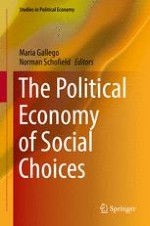2016 | OriginalPaper | Buchkapitel
Negative Advertising During Mexico’s 2012 Presidential Campaign
verfasst von : Andrei Gomberg, Emilio Gutiérrez, Zeev Thepris
Erschienen in: The Political Economy of Social Choices
Aktivieren Sie unsere intelligente Suche, um passende Fachinhalte oder Patente zu finden.
Wählen Sie Textabschnitte aus um mit Künstlicher Intelligenz passenden Patente zu finden. powered by
Markieren Sie Textabschnitte, um KI-gestützt weitere passende Inhalte zu finden. powered by
